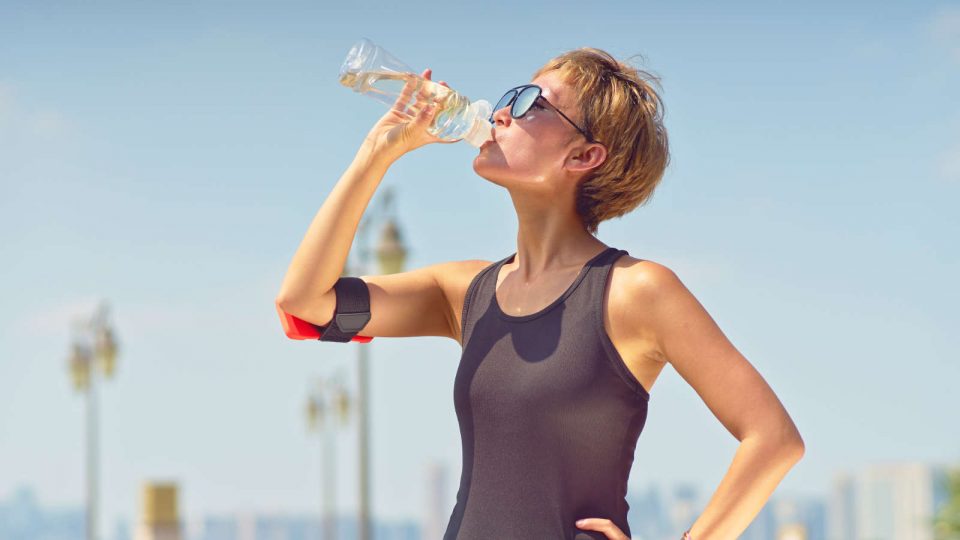If you’re a typical Singaporean runner, you can probably recall at least one time that your stomach sloshed so loudly while running your race, you were sure everyone pacing you could hear it! But what’s a runner to do when it’s imperative to drink as much as possible to keep one’s body moving like a well-oiled machine? Drink up, of course.
The debate about how much liquid to drink seems never-ending—especially since scientists keep coming up with great new research on the subject. Mind if we add our two cents while you drink up?
Getting To The Heart Of Pre-Race Hydration
The Journal of Athletic Training conducted a study that measured performances of athletes who skipped pre-race hydration in 80-degree weather.
They finished 2.5 minutes slower than properly-hydrated competitors. The reason? The body dries up like a wilted flower, blood volume drops and dealing heat exacerbates the problem.
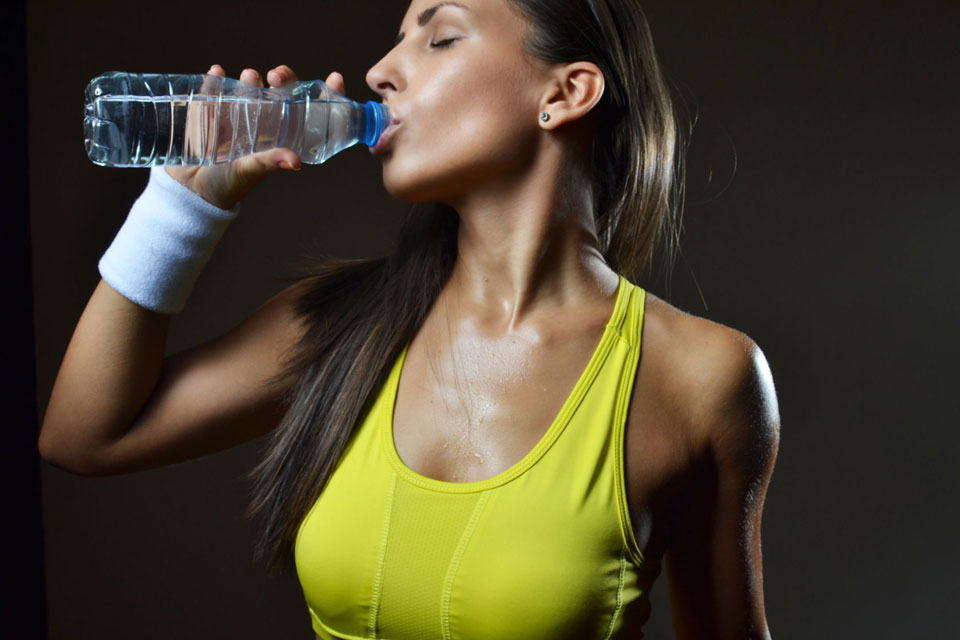
The organ that takes the biggest beating is, frighteningly, your heart! To make up for a lack of fluids, it starts beating harder and faster. Can you can imagine how this affects performance on the track?
As a rule of thumb, drink from eight to 16 ounces of liquid two hours before you run, or between four and eight ounces 15 to 30 minutes before you hit the start line and your heart will thank you.
Does Temperature Matter?
That depends upon your race. A Medicine & Science in Sports & Exercise (MSSE) study concluded that athletes who are literally and physically chilled because they indulge in icy cold beverages before and after exercising, kept up their pace 12 percent longer than those imbibing in room temperature or warm liquids.
So, if someone offers you a chilled beverage like a slushy made with either water or a sports drink, don’t turn them down—especially if the weather is hot—but don’t guzzle or you invite stomach cramps. On the other hand, use your common sense to determine drink temperatures if you’re running in freezing cold weather.
How Well Do You Know Your TQ (Thirst Quotient)?
You know your training eating habits. You know your training route. But do you know how much water your body craves? You should.
At the University of Nottingham in the UK, sports scientists decided to find out whether pre-planning hydration helps athletes perform better, so they asked runners to keep a diary, writing down how often they drank and how much they consumed.
You may wish to try this out, especially during runs, so you can figure out your own thirst patterns.
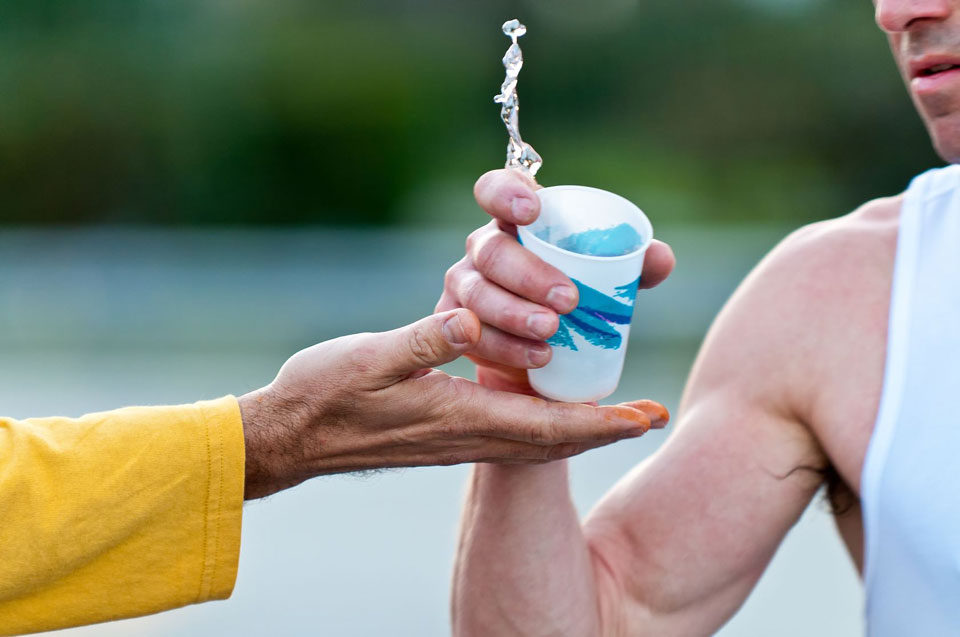
If you use a watch to notify you every 15 minutes that it may be time to drink something, you can turn this experiment into one of the best habits you acquire, because your body will stay perpetually hydrated (and, this is known to be the antidote to the aforementioned stomach slosh).
To Sip Or Not To Sip; That Is The Question
A funny thing happened to runners on their way to a short running event: they didn’t feel thirsty! Can you relate? What’s a runner to do when her head says “drink up” and her body says, “I’m not thirsty”? Master the art of the sip.
Substitute a sports drink for water and rinse out your mouth with a carb-loaded drink at the start line—and every 15 minutes thereafter.
According to Dr. Ian Rollo, co-author of a 2010 journal article published by the MSSE, “Carbs trigger reward centres in the brain,” so even if you just swish a sports drink around your mouth, you may run faster and longer because the brain is fooled into thinking it’s gotten a boost of carbs.
That stated, please note that the swish sip should be used only for short runs. This is not the way to hydrate during a marathon or ultra!
Does What You Drink Matter?
You bet! Like most activities you undertake in life, there’s salvation in moderation and of course, that advice translates to your favourite sports endeavour. Water is important. But so are sports drinks (home-made or commercial), so take a close look at the facts.
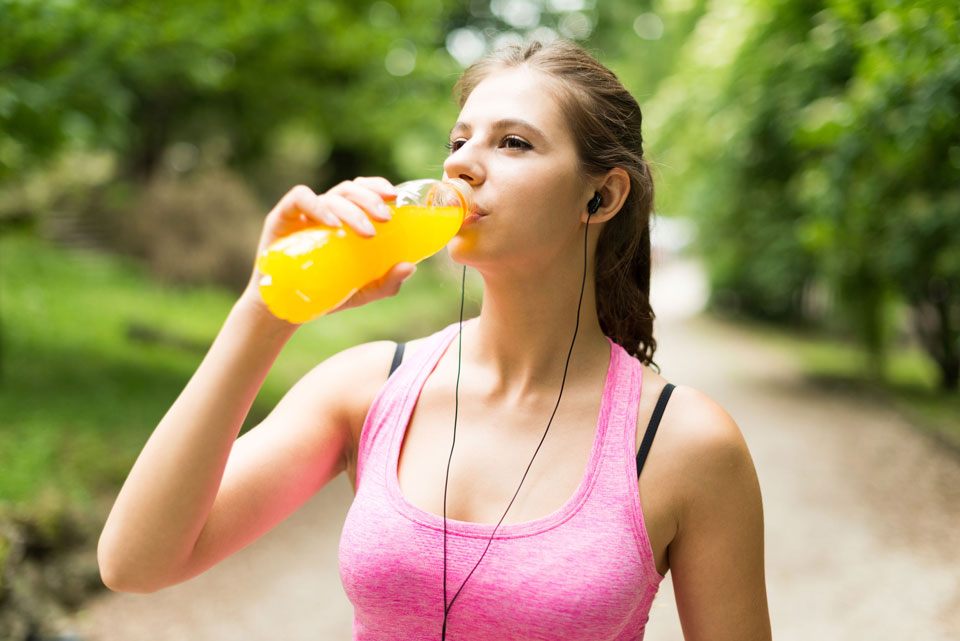
There are reasons sports drinks are better than water: they are absorbed into the body faster, and from the moment they hit the blood stream, they act like body fluids thanks to the concentration of nutrients used in these formulations.
In other words, these drinks get to the bloodstream faster than water so they actually help regulate fluid balance, a critical aspect of hydration. Further, runners drink more because sodium is an important sports drink additive.
Does This Mean Any Sports Drink Will Do?
Not necessarily. Read labels and if there’s less than 15 mg of sodium per ounce, look for another brand! According to physiologists at Spain’s San Antonio Catholic University, you might also want to search labels for signs that carbs and proteins are in the formula, because protein aids in fluid retention, thus athletes stay hydrated for longer periods of time.
Need more convincing? St. Cloud State University cyclists exercised until they had lost 2-percent of their body weight and drank one of three beverages: a drink containing carbs and protein, a commercial sports drink with just carbs and electrolytes and plain water.
Three hours later, only 53-percent of the water drinkers remained hydrated, 75-percent of those who drank the sports drink followed suit, but of the group drinking the carb + protein formulation, 88-percent retained enough fluids to keep going. There’s no refuting those numbers if you’re seeking ways to stay as hydrated as possible.
Don’t Sweat It — Or Maybe You Should!
Even if you’re religious about drinking sports beverages and water, you might still be stressing your body if you don’t keep tabs on perspiration and urination.
As a runner, you can’t afford to ignore either, so become a close observant of your sweat and urine output by monitoring how much you lose.
How much is dangerous? If you lose only 1-percent of your body weight, your performance could be impaired.
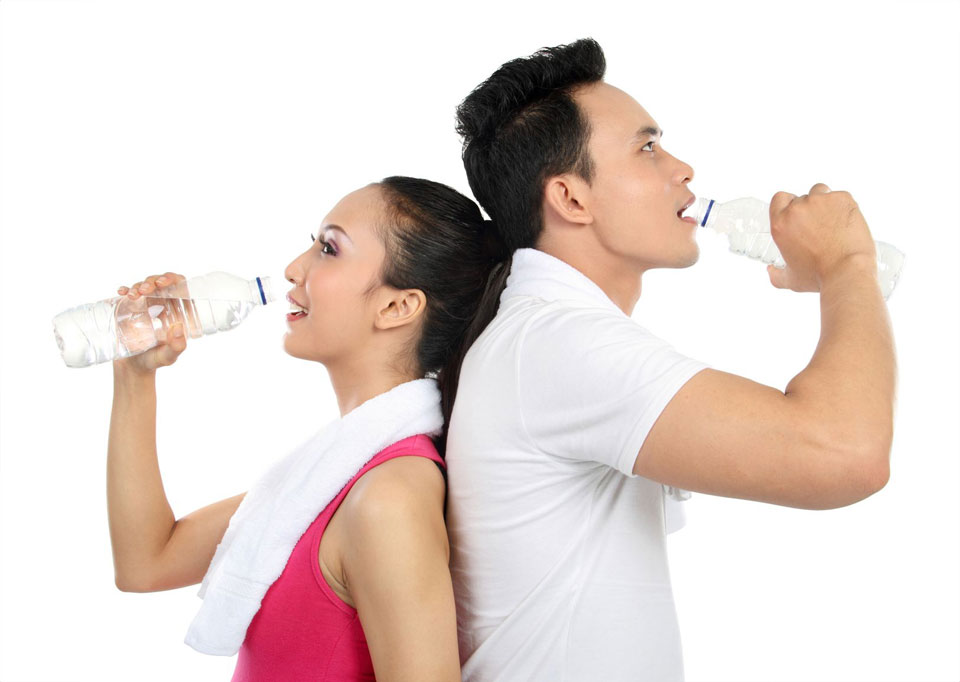
Can you monitor your output? You can; weigh yourself nude before you run for an hour. Weigh yourself again. Have you lost more than 1-percent of your weight? You’ll need to compensate.
As a rule of thumb, says Nancy Clark, author of the Sports Nutrition Guidebook, you must consume around 16 ounces of water to replace every pound loss. And as a final check-in, your urine colour should remain very light, a positive sign that you’re not retaining fluids.
Need A Schedule?
While nothing is set in stone — and you may already have adopted a run hydration ritual — this one makes a good start if you’re just getting into the game. Before you run your race, drink eight to 16 ounces of liquid two hours in advance of your start time.
During the race, ingest between three and six ounces of water or sports beverage every 15 to 20 minutes. Focus on replenishing sodium. Intersperse water with sports drinks to avoid too much sugar.
If your marathon goes more than four hours, drink three to six ounces of sports drink every 15 minutes.
Post-marathon, consume between eight and 24 ounces. You should drink enough to send you to the bathroom in an hour — 90 minutes at most.
Can you drink too much? As long as your thirst isn’t getting in the way of your lifestyle, satisfy it, but remember that thirst can be a sign of diabetes and other illnesses so if you feel as though you’re losing fluids faster than you can replace them, check with your doctor to get his opinion.
Drink Up!
Scientific findings point to drinks that include protein in the mix to keep runners hydrated better than water, but products on today’s market tend to be carb-based only.
Have you ever experimented with sports drinks to see which one serves your body best? Which one(s) do you recommend?
PS: In order to go green and cut down waste, why not adopt the “Bring Your Own Bottle” initiative for your next race. Additionally, you can try beer as your post-run beverage!



